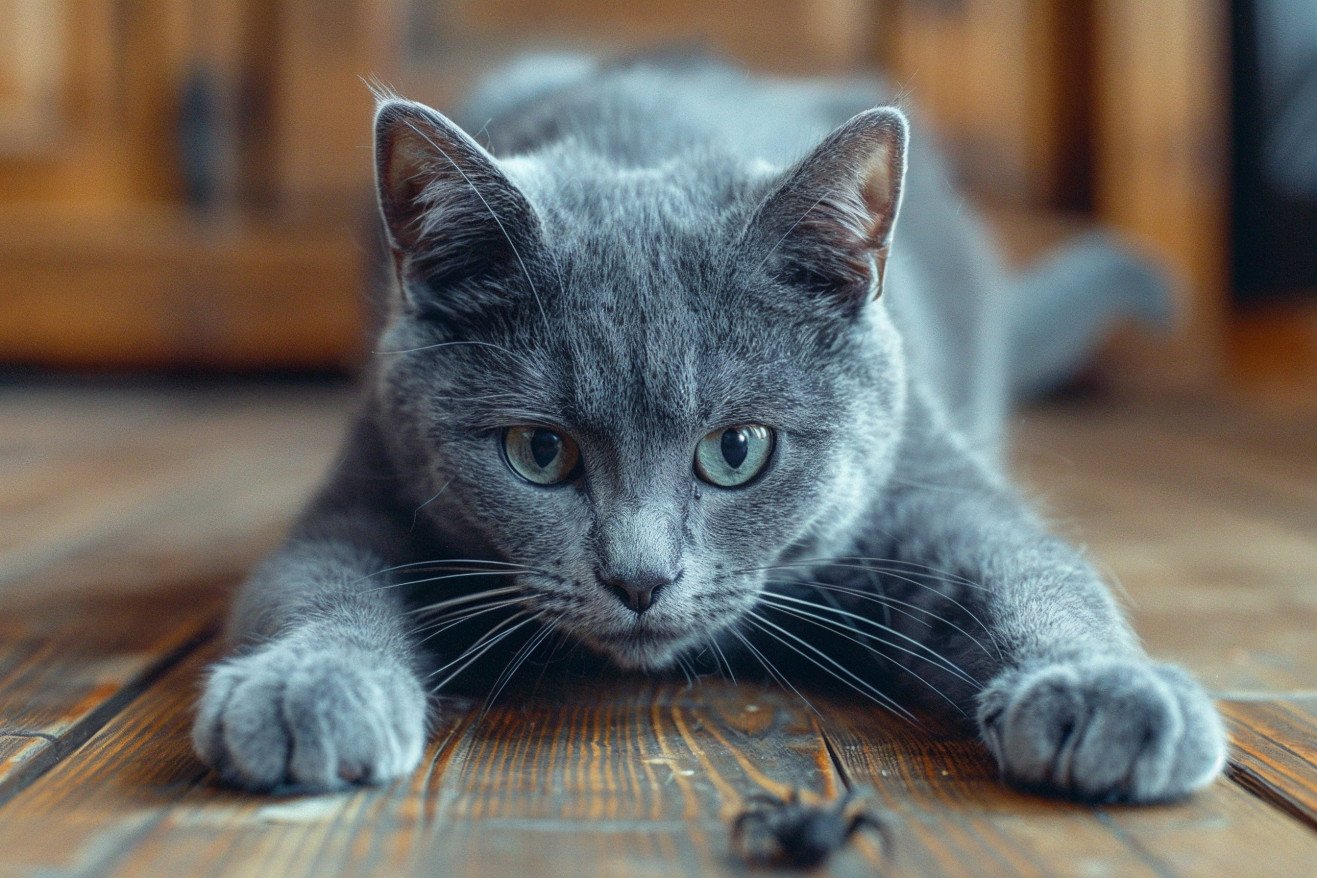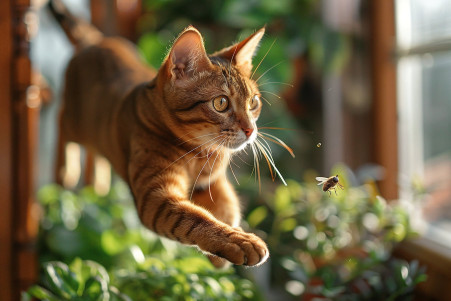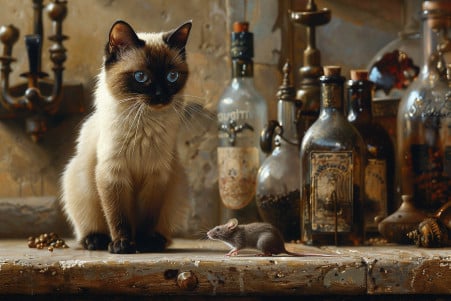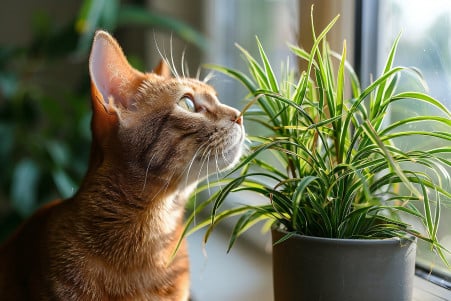Can Cats Eat Spiders? Insights on Feline Predatory Instincts
13 March 2024 • Updated 11 March 2024

If you’ve ever watched your cat chase a spider, you may have wondered if it’s safe for them to eat their eight-legged prey. For the most part, cats can eat spiders without any issues, as it’s a normal part of their hunting behavior.
However, while most spiders are harmless, there are a few, like the Black Widow and Brown Recluse, that can be dangerous. That said, you should always keep an eye on your cat and contact your vet if you notice any concerning symptoms.
In this article, we’ll take a deep dive into what we know about the dietary habits of cats, drawing on research from veterinary science and animal behavior to learn more about the impact of cats eating spiders.
We’ll look at the risks of venomous spiders, the nutritional value of insects in a cat’s diet, and the predatory instincts that lead cats to hunt and eat spiders. Along the way, we’ll also explore the evolutionary and domestic factors that shape a cat’s relationship with spiders, shedding light on this interesting part of feline behavior.
Can cats eat spiders?
Instincts and Learning That Drive Cats’ Hunting Behavior
Cats have a strong hunting instinct, an evolutionary adaptation that has helped ensure the species’ survival for thousands of years. According to Purina, this instinct is a natural behavior that cats have inherited from their wild ancestors, who had to hunt to find food. Even when they’re well-fed, cats’ hunting instincts are still strong and can be triggered by the sight of a bird flying or the movement of small prey like spiders.
A study by Tractive explains that a mother cat’s influence is important in the development of a kitten’s hunting skills. Kittens learn to hunt by watching their mother and copying her hunting behaviors, and they also practice their hunting skills through play. This is important because it allows kittens to develop the predatory motor patterns they need to hunt and catch prey, rather than just for fun.
While domestication hasn’t reduced cats’ hunting instincts, it has changed the way they express them. According to Four Paws International, domestic cats can spend several hours a day hunting, whether that’s through real hunting or play that simulates hunting.
Whether a cat is an indoor or outdoor pet also affects their hunting behavior. Outdoor cats have more opportunities to encounter real prey, while indoor cats are more likely to use toys to simulate hunting.
For cat owners, it’s important to understand both the instinctual and learned components of feline predatory behavior. Doing so can help us better meet our cats’ needs and may even allow us to supplement their diet with natural prey, like harmless spiders.
Evaluating the Nutritional Content of Spiders in a Cat’s Diet
While cats are known to exhibit predatory behavior by hunting insects, including spiders, what exactly is the nutritional content of these bugs? Studies have shown that insects can provide animals with a high-quality, sustainable source of protein.
In fact, a study in PMC by Dennis G. A. B. Oonincx found that the protein content of several insects was similar to that of conventional pet food ingredients like poultry and fish meal. This suggests that spiders, which have a similar biological makeup to the insects studied, could be a viable source of protein in a cat’s diet.
That said, the digestibility and overall nutritional value of spiders has not been studied as extensively as other insects. While the protein content and digestibility of insects like house crickets has been found to be similar to that of fish meal, it’s important for pet parents to understand that spiders should not be used as a substitute for a cat’s regular diet.
A cat’s regular diet is typically designed to meet a cat’s specific nutritional needs, and that includes providing the right balance of nutrients that can be found in commercial cat food.
Relying too heavily on spiders in a cat’s diet could lead to nutritional imbalances that could result in deficiencies or excesses, so it’s important to make sure that you’re providing your cat with a varied and balanced diet.
While these natural prey items may be interesting, they should not be considered a staple but rather an occasional addition to a cat’s diet, which can help ensure that they get all the nutrients they need to stay healthy.
Recognizing the Risks of Poisonous Spiders to Cats
Although most spiders pose no threat to cats, there are a few exceptions, most notably the Black Widow and Brown Recluse spiders. Both of these spiders can cause serious problems for cats.
According to PetMD, Black Widow spider venom contains a powerful neurotoxin that can cause severe symptoms in cats, including muscle stiffness, tremors, and difficulty breathing. Cats that show these signs need to be taken to a veterinarian immediately, as the reaction can be fatal.
Vetster explains that the Brown Recluse spider is another concern. The venom of this spider can cause skin necrosis, hemolytic anemia, and kidney damage in cats. Initial symptoms may include a slight stinging sensation, which can progress to more serious issues like ulcerated sores. Bites are usually treated with supportive care because there is no antivenom for either spider.
Pet parents can help reduce the risk of these bites by keeping their homes free of clutter, maintaining a clean living environment, and using glue traps carefully.
That said, pet parents should still be on the lookout, especially if they live in areas where these spiders are common. By being proactive and knowing the signs of a venomous spider bite, pet parents can help keep their cats safe while still letting them enjoy their natural hunting behaviors.
What’s the Natural Diet of Domestic Cats and Why Do They Eat Spiders?
Domestic cats are skilled hunters and will eat a variety of small animals, including birds, rodents, and even small insects like spiders.
A study that tracked more than 900 house cats, as reported by NPR, found that these animals have a significant impact on local wildlife because they tend to focus their hunting activities in a small area around their homes. Given their abundance and accessibility, spiders are a natural choice for the list of animals cats are most likely to eat.
While most insects, including spiders, are safe and may even have health benefits like providing protein, there are also dangers associated with eating wild prey. According to Wikipedia, when wildlife is attacked by cats, they often suffer injuries and systemic infections that can lead to death, even with veterinary care. This is a reminder of the importance of monitoring pet cats that are allowed to go outside and their exposure to potentially dangerous prey.
Cats are also learning animals and are able to change their behavior based on the results of their experiences. While eating spiders and other insects may be part of a cat’s natural diet, it’s important for cat owners to be aware of the potential impact of this behavior on their pet’s health and the local environment.
Making sure a cat has a balanced diet that meets their nutritional needs is important for their overall health and well-being.
Meeting Your Cat’s Nutritional Needs and the Role of Unconventional Foods
Cats have specific nutritional needs that are best met with a diet that includes animal-based proteins. Animal proteins are especially important because they contain all the essential amino acids and other nutrients, like taurine, that cats need. As obligate carnivores, cats need animal proteins for heart health, vision, and other bodily functions.
In addition to protein, the ASPCA says a well-balanced diet for cats includes fats for energy and maintaining cell structure, limited carbohydrates, and plenty of water for hydration.
Unconventional food sources like spiders can cause dietary issues for cats, especially if they become a primary source of nutrition. PetMD explains that while spiders can provide some protein, they don’t offer the complete nutrition that cats get from specially formulated cat foods that meet the standards of the Association of American Feed Control Officials (AAFCO).
Cats’ ancestral diets were heavy in animal proteins, but today’s domesticated cats have different nutritional needs due to their sedentary lifestyles. WebMD explains that overeating and lack of exercise can lead to obesity and other health problems. Cat owners need to be mindful of their cats’ caloric intake to ensure they’re getting a well-rounded diet.
Cats’ water intake is another area that cat owners need to be mindful of. Providing multiple water sources, feeding a combination of wet and dry foods, and limiting treats can help ensure cats maintain a healthy weight and avoid urinary tract diseases. By understanding and meeting these nutritional needs, cat owners can help ensure their cats are healthy and happy for years to come, even if that means they occasionally indulge in a spider.
In Summary: Cat Instincts and the Spider Diet
In summary, although most spiders are not toxic to cats and can be eaten without harm, it is important to be aware. Cats’ natural hunting instincts often lead them to eat spiders, and while this may provide some nutritional value through the protein spiders contain, their small size and lack of other nutrients mean they are not a complete food source for cats.
In particular, pet owners should be aware of the dangers of venomous spiders. Cats can be at risk from both Black Widow and Brown Recluse spiders, and pet owners should make sure to take their cat to the vet right away if they think their cat has been bitten by one of these spiders.
Responsible pet owners should be aware of their cats’ natural instincts and make sure that their diet is complete and provides all the nutrients they need. While spiders may be a part of a cat’s diet, they should not be a substitute for nutritionally complete cat food. By making sure their cats eat a balanced diet and being aware of the dangers of venomous spiders, pet owners can help ensure their cats stay healthy.


